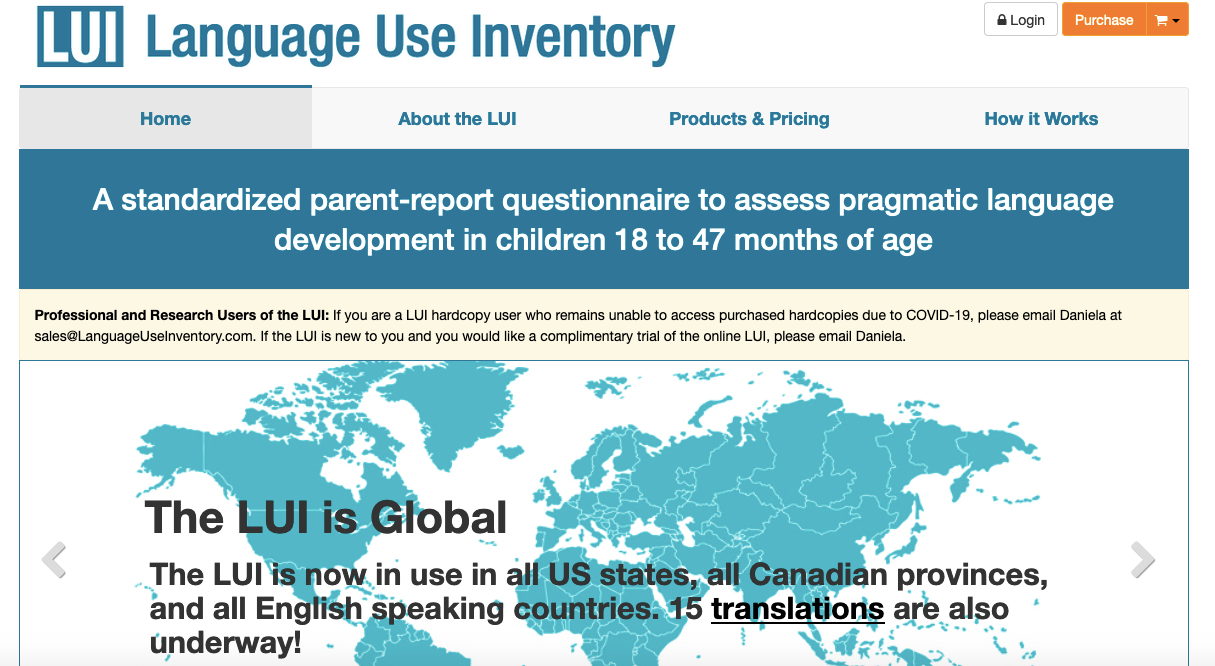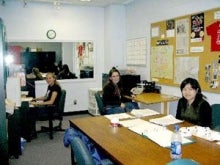Video: Language is an important indicator of early child development: Canadian-designed questionnaire is providing some critical insights. Presented by Research2Reality: Shining a light on research and innovation
The Language Use Inventory (LUI) is a standardized parent questionnaire to assess early language use and pragmatics in children 18 to 47 months of age that was developed by Daniela O'Neill and published in 2009. The LUI is the product of over 12 years of research funded by the Canadian Institutes of Health Research. Below, researchers/clinicians/health professionals, and parents will find more information about the LUI. Researchers interesting in adapting and translating the LUI into another language for use in research will also find relevant information below.
All publications about the LUI from the lab can be found openly available in Publications
If you are a Speech and Language Professional, Health Professional, or researcher interested in obtaining the LUI commercially, it is available in hardcopy or online form to order at LanguageUseInventory.com , a company founded by Daniela O'Neill.

The LUI is used worldwide, all across Canada, in all states in the USA, and in many countries in the world including Australia, New Zealand, Ireland, Scotland, and England. Over 20 translations are underway by researchers around the world.
The LUI is included among a set of recommended measures for assessment of pragmatics in evaluating the efficacy of interventions that target spoken language acquisition in children with autism spectrum disorders by a panel of experts convened by NIH's National Institute on Deafness and Other Communication Disorders (Tager-Flusberg et al., 2009 (PDF)). Many studies using the LUI have now been conducted around the world and these are updated and listed on the Publications page of the LUI commercial site.
The LUI has been added to Best Start's OnTrack Guide for Screening Tools in Ontario.
Here are some media write-ups of this research!
- Parents can help researchers evaluate language skills in autistic children (PDF) in The Record, July 18, 2009
- When words come slowly (PDF) in The Record, December 5, 2003
- Child language research in the spotlight (PDF) in The University of Waterloo Gazette, 2003
For researchers, clinicians and health professionals
Brief overview
The LUI meets urgent calls for a standardized, empirically validated measure of children's early language use (i.e, pragmatic language development) suitable for very young children - 18 to 47 months of age. The LUI has undergone years of development to ensure its internal reliability, discriminative, concurrent and predictive validity. For example, in a study of its ability to distinguish between young children with and without language delay, its sensitivity and specificity was found to be 96%. Detailed information about the LUI and its development is available in O'Neill (2007, Journal of Speech,Language and Hearing Research). A study of its longer-term predictive validity is reported in Pesco & O'Neill (2012, Journal of Speech, Language and Hearing Research) and demonstrates that a child's LUI performance is predictive of longer-term delay and impairment in language at age 5 to 6 years, especially for very low-scoring children at or beyond the age of 24 months. It's sensitivity and specificity in this more rigorous predictive validity study exceeded the most stringent requirements for a screening measure in addition to further supporting its validity as a more in-depth evaluation of social pragmatic communication.
Norms were developed as a result of a cross-Canada standardization study (The Canadian Early Childhood Language Project) involving over 3500 Canadian children from over 550 communities and all provinces and territories. These norms allow a child's score to be quickly converted to a percentile-score relative to peers of the same age in months. A LUI Manual (2009) was written to accompany the LUI for use by clinicians and researchers and aid in administration, scoring and interpretation and is available on the LUI's commercial site. A LUI-French (Canada) version has also been developed and is available (at no cost) in a non-standardized version on the LUI's commercial site.
Development of the LUI and its standardization was funded by the Canadian Institutes of Health Research. The founding of the LUI's publishing company (Knowledge in Development, Inc.) and its later development, in 2016, of a fully online platform to allow online administration of the LUI in addition to a hardcopy version, was made possible by Daniela O'Neill's time as a client at Waterloo's Accelerator Centre, located on the campus of the University of Waterloo, from which her company graduated in 2016.
Interested in using the LUI in your clinic or in a research project?
Researchers and clinicians should find all the information they need at the commerical publisher's website. Further questions can be directed to Daniela O'Neill directly, especially by students, researchers and/or non-profit institutions that may face budget constraints, as the online version of the LUI can be made available at a reduced cost (or sometimes no cost). A list of published works from labs all over the world that have used the LUI is maintained at the LUI publications page.
Interested in adapting the LUI into another language?
Guidelines for the adaptation of the LUI into other languages and instructions for obtaining the required license agreement (free of cost) are available on the publishers' website. Interested researchers can also email Daniela O'Neill directly. A list of all ongoing translations/adaptations of the LUI into other language is maintained at the LUI research translations page. Translations of the LUI are available at no cost to speech-language professionals, clinicians and researchers on the LUI commercial site's translation page.
For parents interested in the LUI
"Thank you for looking into studies that will help our children in the future" (A parent who participated in our Canadian Early Childhood Language Project)
First, a huge thank you to the thousands of parents across Canada who took part in our Canadian Early Childhood Language Project! With your help, we were able to accomplish the goal of having completed questionnaires for over 3500 children that even surpassed our goal of having 100 completed questionnaires for children at every month from 18 to 47 months. This data has allowed us to learn what the typical range of scores on the LUI is for children at each month and develop norms for the LUI in 1-month intervals.
This means that it is now possible for speech-language professional to provide parents (once the LUI is completed by a parent and the score is interpreted by a professional using the norms) with a much more detailed picture of how their child's use of language is progressing relative to children of the same gender and age in months, based on rigourous, empirical data. For example, a parent may learn more quickly that their concerns were justified and their child is scoring at a low percentile for his/her age, allowing intervention to begin sooner. In other cases, a parent may learn that their child's performance is actually on par with the performance of their child's peers. In other words, just as, in the first months and years of your child's life, your doctor told you the your child's percentile score for height and weight, the LUI can similarly provide this information with respect to a child's use of language. It is hoped that the LUI will help to shorten the waiting time for parents to receive an initial assessment of their child's language functioning, and also do so in a timely and cost-effective manner for both parent and child.
Two of the parents taking part in this research told us the following, and we know the LUI is now helping to do just this:
I would like to support this study because I had to go through the long waiting list for a speech therapist to have my son's speech assessed (which turned out to be fine). Having a questionnaire to be used by doctors etc. to assess speech would be much more convenient.
[I] was a kindergarten teacher for many years...Parents are often told not to worry about speech and/or language problems when they inquire with the family doctor or other professionals, about their concerns. I think your assessment will be a great benefit to parents and their children and I look forward to seeing it in use in the near future. If all parents completed it and had it reviewed in a timely fashion by a speech/langauge pathologist then the chidlren who really need services could be seen long before they enter school and parents could be involved in supporting this intervention, given the right direction.
The use and purchase of the LUI is restricted to qualified speech and language, health, clinical and research professionals. If, as a parent, you believe the LUI may be helpful for a concern you have about your child’s language development, one suggestion is to bring the LUI to the attention of a local speech and language professional. If you wish to locate local services related to children’s speech and language development, and more information about children language development, Daniela O'Neill provides and maintains relevant information at https://languageuseinventory.com/Help/ForParents
The following are some further comments we received from some of the parents who took part in the Canadian Early Childhood Language Project and completed the Language Use Inventory Questionnaire.
I have learned a lot about my child from doing this questionnaire.
Very informative!
I thoroughly enjoyed filling out your questionnaire. It was straightforward, user-friendly, and the bracketed examples were very helpful in understanding context. It was a treat to realize how much language my son has. My husband and I got lots of chuckles from your very kid-focused examples. Good luck with the remainder of your study. I look forward to browsing the updates on your website. It was an honor to take part. Thank you.
I'm glad that you touched on teasing and humour because my son is a funny little boy. Thank you for this questionnaire, I have learned a lot from it.
I thank you for your work and hope you have an overwhelming response from participates in order to make this work.
It was interesting filling out your survey. It made me really think about my child's likes and dislikes and what she spends her time doing and talking about. Thanks for the experience.
I enjoyed completing your questionnaire. I look forward to learning more about the results and the implications for our children.
This is a great project.
Launch of the Canadian Early Childhood Language Project
-
December 2, 2003: To help launch the Canadian Early Childhood Language Project, the Centre hosted a visit by Kitchener Mayor Carl Zehr, Regional Chair Ken Seiling, and David Johnston, president of the University of Waterloo! It was a wonderful morning for the Centre, with many our research assistants helping out and several families present who have participated in the Canadian Early Childhood Language Project and other studies at the Centre. You can read about the visit in the uWaterloo Daily Bulletin.
The visit was also featured in an article in the University Gazette.
And here are some pictures!

From bottom left to right: Regional Chair Ken Seiling, Charlotte, Daniela O'Neill, Mayor Carl Zehr, Lucas, Ariana and uWaterloo President David Johnston.

The 2005 Early Childhood Language Project Team in the main office. From left to right: Pandora, Alyse, Jane, and Jennifer.

Research assistants on the 2004-2005 Early Childhood Language Project Team in the research office. From left to right, Elizabeth Brunger, Jeannette Benson and Christina Chen.

The mounties visit our booth at the 2004 Canada Day celebrations at the University of Waterloo! Research assistant, Valerie Athaide, is at right.
